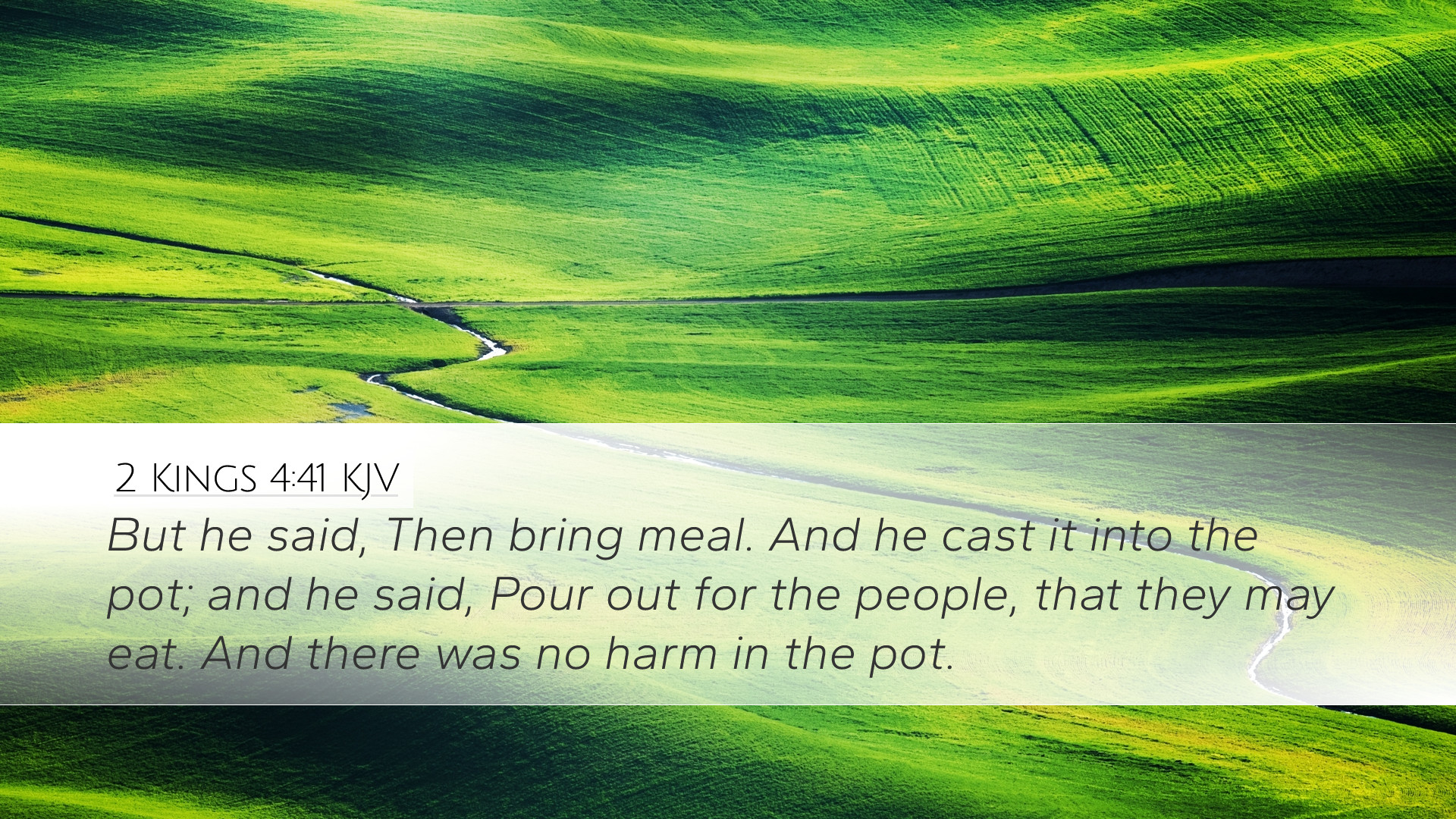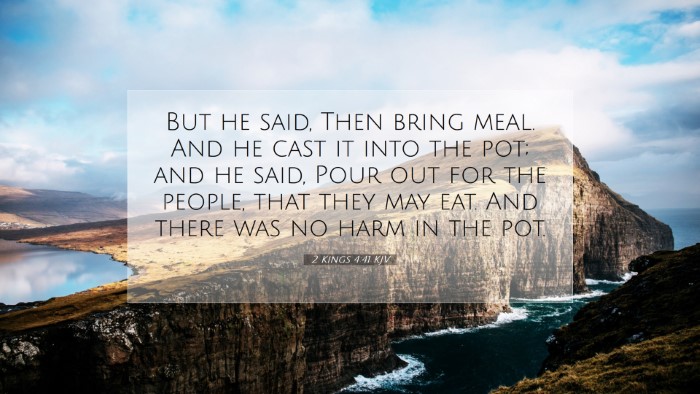Commentary on 2 Kings 4:41
Verse: "But he said, 'Then bring me some flour.' And he threw it into the pot and said, 'Stir it in,' and there was no harm in the pot." (2 Kings 4:41, ESV)
Contextual Overview
This verse occurs within a narrative that illustrates the miraculous works performed by the prophet Elisha. The broader context reveals the ongoing ministry of Elisha in Israel during a time of spiritual decline and danger. The miracle involving the poisoned stew serves as a vivid example of God’s providence and Elisha’s role as a mediator of God's grace.
Commentary Insights
Matthew Henry's Commentary
Matthew Henry notes that this incident illustrates God's providence in the everyday lives of His people. The stew, originally poisonous, symbolizes the trials and dangers faced by the faithful. Elisha’s instruction to add flour serves as a potent reminder of divine intervention. Henry emphasizes that the flour represents God's abundant grace that transforms what is harmful into something wholesome.
- Divine Transformation: Just as the flour neutralizes the poison, God's grace in our lives transforms our circumstances.
- Role of Faith: Elisha’s calm response exemplifies faith amidst crisis, calling believers to trust in divine provision even when facing insurmountable challenges.
Albert Barnes' Commentary
Albert Barnes provides additional insights on the symbolism of the flour, relating it to the concept of sanctification. He argues that the act of introducing flour into the pot is not merely a physical remedy but serves as a symbol of God’s ability to renew and restore. This reflects the theological principle that God can bring good out of evil situations.
- Symbol of Restoration: The flour signifies restoration, where God reclaims our lives from the bitterness of sin and despair.
- Prophetic Authority: Barnes emphasizes Elisha’s prophetic authority, which serves not just to perform miracles but to illustrate God’s active involvement in human affairs.
Adam Clarke's Commentary
Adam Clarke highlights the practical implications of this miracle for the community. In a period of famine, the people’s reliance on faith leaders such as Elisha was paramount. Clarke elaborates on the significance of the communal aspect, noting that the miracle teaches about cooperation and collective faith in God’s provision.
- Community Dependence: The miracle occurred in a communal setting, showcasing the importance of unity and collective faith in overcoming adversity.
- Faith and Works: Clarke underscores the necessity of action in faith. While miraculous intervention was evident, the community had to respond to Elisha’s directive to bring flour.
Theological Reflections
This narrative raises several theological considerations pertinent to pastoral and scholarly reflection:
- God's Sovereignty: The miracle reaffirms God's sovereign authority over nature and human suffering. It is a testament to His ability to intervene and rectify dire situations.
- Faith in Action: The verse emphasizes that faith is not a passive state but requires active participation. The people had to bring flour, which signifies obedience and trust in God’s word delivered through Elisha.
- Community of Faith: The role of community is critical. It illustrates that faith operates within a communal framework where mutual support and shared obedience to God’s commands are essential.
Pastoral Applications
For pastors and church leaders, 2 Kings 4:41 serves as a rich source for preaching and teaching:
- Faith in Crisis: This verse can be a powerful sermon illustration about trusting God during crises. Encourage congregants that God provides remedies—both spiritual and practical—for their challenges.
- Restoration Themes: Highlight how God can take 'poisonous' aspects of life and restore them through His grace. This can resonate deeply with those facing personal or communal struggles.
- Active Participation: Challenge the congregation to be active participants in their faith, emphasizing that God often works through human responses to His directives.
Conclusion
The brief narrative found in 2 Kings 4:41 encapsulates profound theological and practical truths. Through Elisha’s actions and God’s miraculous provision, we observe the intertwining of divine sovereignty with human cooperation. This verse invites believers to reflect on the nature of their faith, the role of community, and the transformative power of God’s grace in everyday life.


